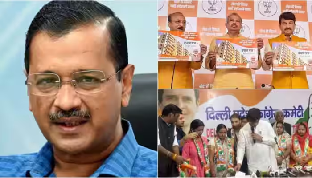Ahead of the Delhi Assembly polls, all major parties seem to be wooing women voters with direct cash transfers. Major political contenders, the Bharatiya Janata Party (BJP), the Aam Aadmi Party (AAP) and the Indian National Congress, have each promised financial assistance schemes for women, a demographic that constitutes 46.2 per cent of Delhi’s electorate. According to the final electoral roll published by the Office of the Delhi Chief Electoral Officer (CEO) on January 6, the national capital has a total of 1,55,24,858 registered voters, comprising 83,49,645 male voters and 71,73,952 female voters. In a bid to woo the female voters and as a countermeasure to AAP’s welfare-centric campaign, BJP has proposed a monthly aid of Rs 2,500 for women.
AAP, under the Mahila Samman Yojana, has pledged Rs 2,100 per month to women, continuing its strategy of offering direct benefits to secure electoral support. Not to be left behind, the Congress has introduced the ‘Pyari Didi Yojana,’ promising Rs 2,500 monthly to women if elected, mirroring similar initiatives it has implemented in other states. These announcements have had a tangible impact on voter registration dynamics. Between December 16 and January 6, Delhi’s Chief Electoral Office received an unprecedented 5.1 lakh applications for new voter registrations, with nearly 70 per cent (approximately 3.4 lakh) submitted by women. The promise of monthly financial aid has sparked mixed reactions among women voters in Delhi, reflecting diverse needs and priorities.
“I appreciate the focus on women, but I would rather see schemes that create job opportunities or improve public safety for women. Monthly cash handouts might help temporarily, but they don’t solve larger problems.” Rukhsar Ansari, a resident of Old Delhi, welcomed the initiative but with caution.
“It’s a good step, especially for women like me who run small businesses. Even a small amount can help us invest in our work. But I feel politicians remember us only during elections. What happens after they win?” For Asha Kumari, a domestic worker from West Delhi, these schemes offer some hope amidst economic challenges.”The money promised by these schemes can ease our struggles, especially with rising prices. But instead of just cash, they should also focus on better schools for our children and affordable healthcare for families.” Geeta Devi, a senior citizen from Rohini emphasised the importance of such schemes for financial independence. “For women like me who don’t have any source of income, these schemes could provide a little financial independence.
But I hope the government doesn’t cut other benefits like subsidised food to fund these payments.” These voices reflect the nuanced views of women voters, highlighting that while direct financial aid is valued, broader systemic improvements remain a key demand. As Delhi heads to the polls in February, the emphasis on direct cash transfers to women underscores the growing recognition of their electoral significance. Whether these financial promises will translate into votes remains to be seen. However, their prominence in campaign strategies highlights a pivotal shift towards gender-focused electoral appeals in the capital’s political arena.



